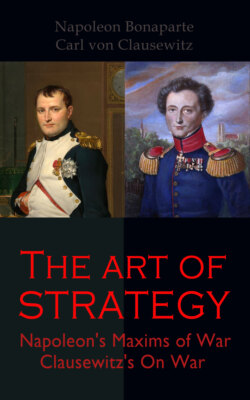Читать книгу The Art of Strategy: Napoleon's Maxims of War + Clausewitz's On War - Carl von Clausewitz - Страница 102
На сайте Литреса книга снята с продажи.
11. THE POLITICAL OBJECT NOW REAPPEARS.
ОглавлениеHere the question which we had laid aside forces itself again into consideration (see No. 2), viz., the political object of the War. The law of the extreme, the view to disarm the adversary, to overthrow him, has hitherto to a certain extent usurped the place of this end or object. Just as this law loses its force, the political must again come forward. If the whole consideration is a calculation of probability based on definite persons and relations, then the political object, being the original motive, must be an essential factor in the product. The smaller the sacrifice we demand from ours, the smaller, it may be expected, will be the means of resistance which he will employ; but the smaller his preparation, the smaller will ours require to be. Further, the smaller our political object, the less value shall we set upon it, and the more easily shall we be induced to give it up altogether.
Thus, therefore, the political object, as the original motive of the War, will be the standard for determining both the aim of the military force and also the amount of effort to be made. This it cannot be in itself, but it is so in relation to both the belligerent States, because we are concerned with realities, not with mere abstractions. One and the same political object may produce totally different effects upon different people, or even upon the same people at different times; we can, therefore, only admit the political object as the measure, by considering it in its effects upon those masses which it is to move, and consequently the nature of those masses also comes into consideration. It is easy to see that thus the result may be very different according as these masses are animated with a spirit which will infuse vigour into the action or otherwise. It is quite possible for such a state of feeling to exist between two States that a very trifling political motive for War may produce an effect quite disproportionate—in fact, a perfect explosion.
This applies to the efforts which the political object will call forth in the two States, and to the aim which the military action shall prescribe for itself. At times it may itself be that aim, as, for example, the conquest of a province. At other times the political object itself is not suitable for the aim of military action; then such a one must be chosen as will be an equivalent for it, and stand in its place as regards the conclusion of peace. But also, in this, due attention to the peculiar character of the States concerned is always supposed. There are circumstances in which the equivalent must be much greater than the political object, in order to secure the latter. The political object will be so much the more the standard of aim and effort, and have more influence in itself, the more the masses are indifferent, the less that any mutual feeling of hostility prevails in the two States from other causes, and therefore there are cases where the political object almost alone will be decisive.
If the aim of the military action is an equivalent for the political object, that action will in general diminish as the political object diminishes, and in a greater degree the more the political object dominates. Thus it is explained how, without any contradiction in itself, there may be Wars of all degrees of importance and energy, from a War of extermination down to the mere use of an army of observation. This, however, leads to a question of another kind which we have hereafter to develop and answer.
